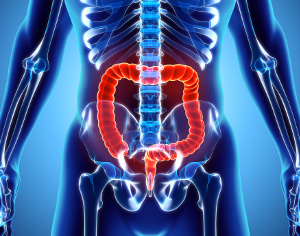Vitamin D may protect younger adults against bowel cancer
 Colorectal cancer is one of the most common cancer forms in Denmark, which is why prevention is so important. According to a new American study that is published in Gastroenterology, increased intake of vitamin D appears to protect against bowel cancer, especially in people younger than 50 years. It even looks as if vitamin D may prevent intestinal polyps that can turn into cancer in some cases. The scientists say that higher intake of vitamin D may be relevant for prevention and may also serve as an inexpensive supplement to screening tests that are merely used for early diagnosis.
Colorectal cancer is one of the most common cancer forms in Denmark, which is why prevention is so important. According to a new American study that is published in Gastroenterology, increased intake of vitamin D appears to protect against bowel cancer, especially in people younger than 50 years. It even looks as if vitamin D may prevent intestinal polyps that can turn into cancer in some cases. The scientists say that higher intake of vitamin D may be relevant for prevention and may also serve as an inexpensive supplement to screening tests that are merely used for early diagnosis.
Although the incidence of colon cancer is decreasing, the rate among younger adults seem to be increasing. This is an unsettling tendency that is difficult to explain. It also looks as if the vitamin D synthesis from sun exposure and the intake of vitamin D from food sources like oily fish, eggs, dairy products, and mushrooms has decreased over the past decades. A team of scientists from Dana-Farber Cancer Institute and the Harvard T.H Chan School of Public Health therefore decided to look closer at the relation. Earlier studies have shown a link between vitamin D levels and the risk of dying of bowel cancer, but science still hasn’t looked at the relation between the total intake of vitamin D and bowel cancer incidence in people under the age of 50 years.
|
The scientists behind the new study gathered data from a large population study named Nurses Health Study (NHS) that was initiated in 1989 and includes 94,205 female nurses aged 25-42 years. Every other year, the participants are asked to fill in questionnaire with information about their diet, lifestyle, medicine use, and other relevant health information. The scientists mainly concentrated on women who had been diagnosed with bowel cancer before they turned 50. The researchers also collected data about intestinal polyps discovered via colonoscopies or sigmoidoscopies, as polyps may be a warning sign of bowel cancer.
During the period from 1991-2015, the scientists documented a total of 111 cases of bowel cancer in young adults and 3,317 cases of intestinal polyps.
Meanwhile, analyses showed that high vitamin D intake was significantly related to a lower risk of intestinal polyps and bowel cancer in women under the age of 50.
On the other hand, there was no significant relation between total vitamin D intake and the risk of bowel cancer in people older than 50. This calls for additional studies to determine if vitamin D is most effective as prevention in people younger than 50 years of age.
In any case, the researchers conclude that a high vitamin D intake is significantly related to a reduced risk of developing intestinal polyps and bowel cancer. It also important to realize that lack of vitamin D is a risk factor and it is therefore necessary to introduce new guidelines for diet and lifestyle as a way of preventing bowel cancer. The new study is published in Gastroenterology.
Vitamin D sources and the need for the nutrient
The sun is our primary source of vitamin D, which our skin synthesizes in response to being exposed to UVB rays from the sun. At our latitudes, however, this is only possible during the summer period where the sun sits sufficiently high in the sky. We also get vitamin D from foods like cod liver, cod roe, and oily fish, eggs, and high-fat dairy products but there is generally comparatively little vitamin D in food, which is why the Danish Veterinary and Food Administration has issued new guidelines for the use of supplements.
High-dosed (20-80 micrograms) vitamin D supplements are available on the market and our real need for the nutrient hinges on such factors as sun exposure, age, skin type, BMI, and chronic diseases. EU’s Scientific Committee on Food has set 100 micrograms per day as the safe upper intake level for vitamin D for adults, including pregnant and breastfeeding women.
Vitamin D is lipid-soluble which is why taking the nutrient in oil in soft gelatin capsules helps us utilize it the best.
Selenium also prevents bowel cancer
Several studies in the past have showed that selenium yeast may also lower the risk of bowel cancer. Unfortunately, the selenium content in European farmland is low and many people get far too little of this vital nutrient.
References:
Hanseul Kim, et al. Total vitamin D Intake and Risks of Early-Onset Colorectal Cancer and Precursors. Gastroenterology, 2021
Dana-Farber Cancer Institute. Vitamin D may protect against young-onset colorectal cancer. ScienceDaily 2021
New Links between selenium and cancer prevention. HRB. December 2017
Clark LC et al: Effects of Selenium Supplementation for Cancer Prevention in Patients with Carcinoma of the Skin. JAMA: 1997.
Bonelli et all. Antioxidant supplement and long-term reduction of recurrent adenomas of the large bowel. A Double-blind randomized trial. J. Gastroenterol 2013
Bonelli Luigina. Reduction of the Incidence of Metachronous Adenomas of the Large Bowel by Means of Antioxidants". Colon Cancer Prevention 1999
Search for more information...
- Created on .








